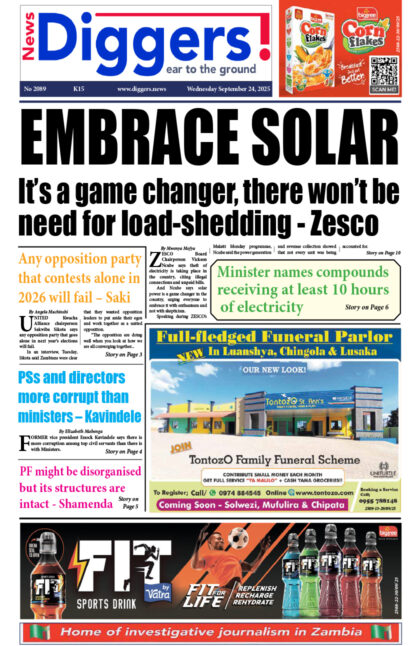THE Jesuit Centre for Theological Reflection (JCTR) has asked government to consider increasing the non-taxable income threshold to K4,300 from the current K3,300 to help citizens cope with the rising cost of living.
And the Centre has called on government to lower public expenditure and reduce external borrowing to revive the country’s economy as part of the 2021 national budget.
In an interview, JCTR programmes manager Innocent Ndashe appealed to government to help citizens cope with the rising cost of living, which had gone far above K7,000 per month for the average family of five in Lusaka.
“Recognising that, generally, the cost of living has been on the increase, on average I think nationally it’s not less than K5,500. I know for other areas, like Lusaka, the cost of living is already sky-rocketed to more than K7,000, but on average it’s a minimum of K5,500. So, meaning one way in which even those that are possibly been put on maybe half salary and a few others because businesses have been hit by the COVID pandemic and not everyone is getting the required pay and income so how do you then bring relief to the people in employment, who are not affording the cost of living would be to ensure that government considers to adjust gradually the non-taxable income threshold. At the moment it’s K3,300 and if you are talking of an average cost of living of a minimum K5,300, that is way below that, meaning we’ve been denying our citizens to afford decent nutritious food; we’ve been denying our people to have access to clean water, to send children to school, to access quality healthcare services,” Ndashe said.
“So, what government needs to do is to bring relief. How do you bring relief? Gradually, I think we can improve that and we are recommending that the threshold is reduced to a minimum of something around K4,300, at least an increment of K1,000 would help and then subsequently as things stabilise, I think we would hope that it’s increased further possibly in 2022 to around K5,000 or even more depending on how economic activities will be.”
And Ndashe said government should ensure that it tightens controls on public expenditure and reduce external borrowing in next year’s budget.
“What we would want to see in next year’s budget is for government to recommit to reduce external borrowing and try to utilise every opportunity that arises within the country to generate revenue. I mean, there are a lot of taxes, we know the few other enterprises that are missed in terms of government collecting taxes in different forms so they need to expand to see how we can capture those that are yet to be captured to ensure that we reduce external borrowing. And also, tighten measures that will reduce wastage,” Ndashe said.
He urged government to consider creating a fund for small businesses to help keep them afloat in the wake of the COVID-19 pandemic.
“The impact of the COVID pandemic; I think government needs to ensure that how do we keep afloat, for example, small enterprises and other businesses that contribute to the Zambian economy would be to create a fund that would ensure that you keep them afloat. But more importantly, also, what we would be hoping to hear from the (2021) budget, commitment to ensure that there are clear guidelines that would help the ordinary person; those that are running small businesses to be able to have access to, for example, easy credit or soft loans, those where they can pay at minimum maybe small interest rates to ensure that people can grow their businesses,” he said.
He observed that resources channelled through the Social Cash Transfer (SCT) scheme needed to be increased.
“In this particular situation, I think we need to ensure that we allocate adequate resources that would ensure that the social protection programmes are more sustainable. Programmes like the SCT programme have been quite helpful at least from a few stories for those that have been able to get it, it has helped them to be creative. So, I mean all government needs to do is to allocate adequate resources, but more importantly would also to revise the monthly allocations. I know persons with disabilities get K180 per month, which means K360 bi-monthly and the vulnerable and the other categories get K90. But looking at the rising cost of living, I think those amounts moving into next year, at this particular time are nothing,” said Ndashe.
























